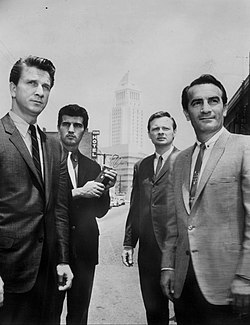This article needs additional citations for verification .(February 2024) |
| The New Breed | |
|---|---|
 Main cast members Leslie Nielsen, Greg Roman, John Clarke, and John Beradino in the October 1, 1961 series premiere "No Fat Cops" | |
| Genre | Crime drama |
| Created by | Hank Searls |
| Written by | Don Brinkley Peter B. Germano Jesse L. Lasky, Jr. Pat Lasky |
| Directed by | Walter Grauman Jerry Hopper Allen H. Miner Joseph Pevney Pat Silver-Lasky Hank Searls Sheldon Stark |
| Starring | Leslie Nielsen John Clarke John Beradino Byron Morrow Greg Roman |
| Theme music composer | Dominic Frontiere |
| Country of origin | United States |
| Original language | English |
| No. of seasons | 1 |
| No. of episodes | 36 |
| Production | |
| Executive producer | Quinn Martin |
| Producer | Walter Grauman |
| Running time | 60 minutes (approx) |
| Original release | |
| Network | ABC |
| Release | October 3, 1961 – September 25, 1962 |
The New Breed is an American crime drama series that aired on ABC from October 3, 1961, to September 25, 1962, [1] [2] with thirty-six episodes.[ citation needed ] It was broadcast on Tuesdays, initially from 9 to 10 p.m. Eastern Time and then (beginning in November 1961) from 8:30 to 9:30 p.m. E. T. [2] The series was a QM Production in association with Selmur Productions, Inc.